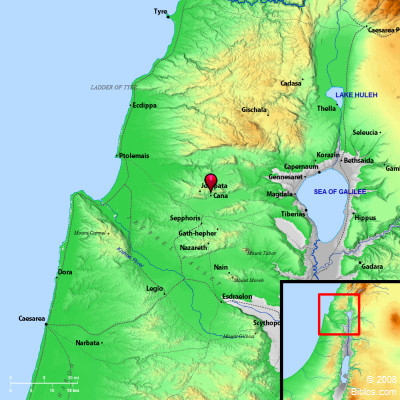Atlas  Cana and surrounding region Maps Created using Biblemapper 3.0 Additional data from OpenBible.info You are free to use up to 50 Biblos coprighted maps (small or large) for your website or presentation. Please credit Biblos.com. Occurrences John 2:1 The third day, there was a marriage in Cana of Galilee. Jesus' mother was there.John 2:11 This beginning of his signs Jesus did in Cana of Galilee, and revealed his glory; and his disciples believed in him. John 4:46 Jesus came therefore again to Cana of Galilee, where he made the water into wine. There was a certain nobleman whose son was sick at Capernaum. John 4:47 When he heard that Jesus had come out of Judea into Galilee, he went to him, and begged him that he would come down and heal his son, for he was at the point of death. John 21:2 Simon Peter, Thomas called Didymus, Nathanael of Cana in Galilee, and the sons of Zebedee, and two others of his disciples were together. Encyclopedia CANA, OF GALILEEka'-na, (Kana tes Galilaias): This was the scene of Christ's earliest miracle, when, at the marriage feast, He turned water into wine (John 2:1). It was the home of Nathaniel (John 21:2). From Cana, after the marriage, Jesus "went down" to Capernaum (John 2:12), and returned at the request of the centurion (John 4:46, 51). These are the only notices of Cana in Scripture, and from them we learn merely that it was in Galilee, and in the uplands West of the lake. Other villages of the same name are mentioned by Josephus, but probably this one is intended by the Cana where for a time he dwelt (Vita, 16) which he locates in the plain of Asochis (ibid., 41). The Greek kana probably transliterates an old Hebrew qanah, "place of reeds." This ancient name survives in Khirbet Qana, a ruined site with rockhewn tombs, cisterns and a pool, on the northern edge of Sahl el-Battauf, the plain of Asochis. Near by are marshy stretches where reeds still abound: the name therefore is entirely appropriate. The name Qana el-Jelil, the exact Arabic equivalent of Kana tes Galilaias, is also heard among the natives. This, however, may have arisen from the suggested identification with Cana of the Gospel. The position agrees well enough with the Gospel data. CANA of GALILEE, some say, with tradition, was at kefr Kenna which means village of Cana. Others suppose that it was at the place called Kenna el Jelil which means Cana of Galilee, where ruins are to be found. The former is 3 2/3 ms. n.e., and the latter 8 ms. n. of Nazareth. Strong's Greek G2580: KanaCana, a city in Galilee |



